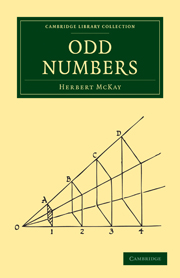Book contents
- Frontmatter
- Contents
- CINDERELLA IN GLASS SLIPPERS
- Millions & Billions & Trillions
- Great Powers & Little Powers
- How we got Logarithms
- Proportion
- Comparisons
- Proportion in Triangles
- Weights & Measures
- The Delusive Average
- Approximations
- Multiplication & Division
- Tables
- Units
- Oddities of Numbers
- The Construction & Solution of Problems
- Scales of Notation
- Frontmatter
- Contents
- CINDERELLA IN GLASS SLIPPERS
- Millions & Billions & Trillions
- Great Powers & Little Powers
- How we got Logarithms
- Proportion
- Comparisons
- Proportion in Triangles
- Weights & Measures
- The Delusive Average
- Approximations
- Multiplication & Division
- Tables
- Units
- Oddities of Numbers
- The Construction & Solution of Problems
- Scales of Notation
Summary
When we are measuring, we want a convenient amount of the quantity which is being measured, as a unit for measuring. We have already seen how this idea of a convenient quantity runs all through the English system of weights and measures. There are people who imagine the English weights and measures to be haphazard and devoid of system; but they are usually the intelligentsia, who have not even considered what a unit is—the kind of people who swallow “intelligence tests” with their mouths open. A rigid decimal system has its advantages; for scientific purposes, it enables the exact degree of approximation to be stated; and presumably such a system is easier for peoples of inferior arithmetical ability. But for convenience in everyday working there is no comparison between the English weights and measures, and the inflexible decimal system. If the British people were to give up their weights and measures, for a mess of decimal pottage, they would be abandoning a wonderful system, devised by their Anglo-Saxon forbears who were arithmetical geniuses.
People who try to persuade us to abandon our ad hoc system might reflect that we are always trying to devise suitable ad hoc units. We choose a unit to fit a particular kind of measurement, quite irrespective of whether it fits in or not with the metric system.
When numbers get inconveniently large or inconveniently small it is a very usual practice to find a more suitable unit, one which will reduce the numbers to a reasonable size.
- Type
- Chapter
- Information
- Odd Numbers , pp. 162 - 170Publisher: Cambridge University PressPrint publication year: 2009First published in: 1940

